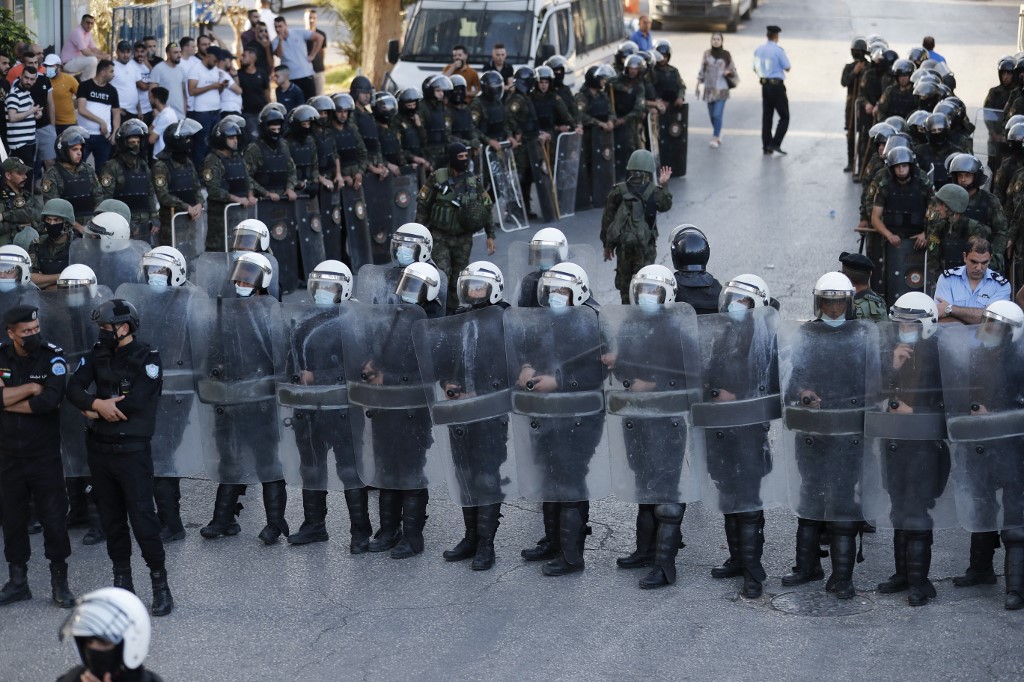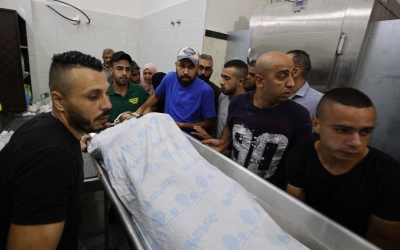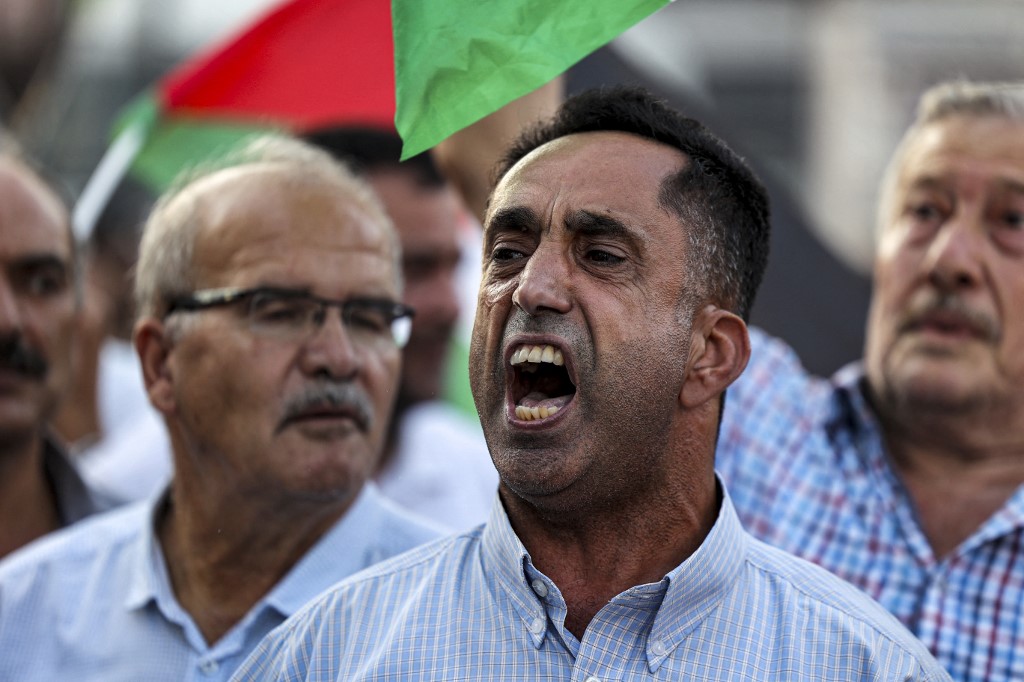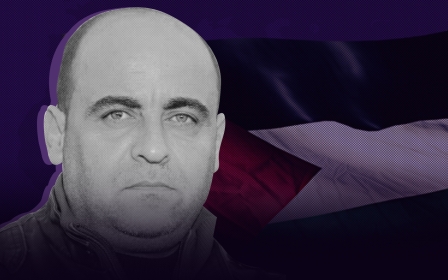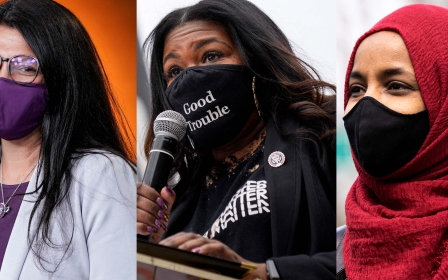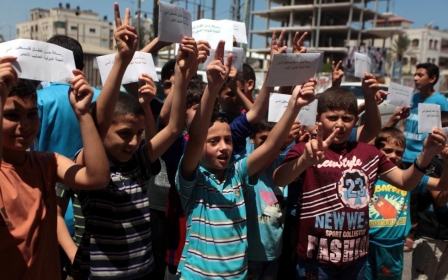Palestinian Authority losing control of West Bank, say insiders and activists
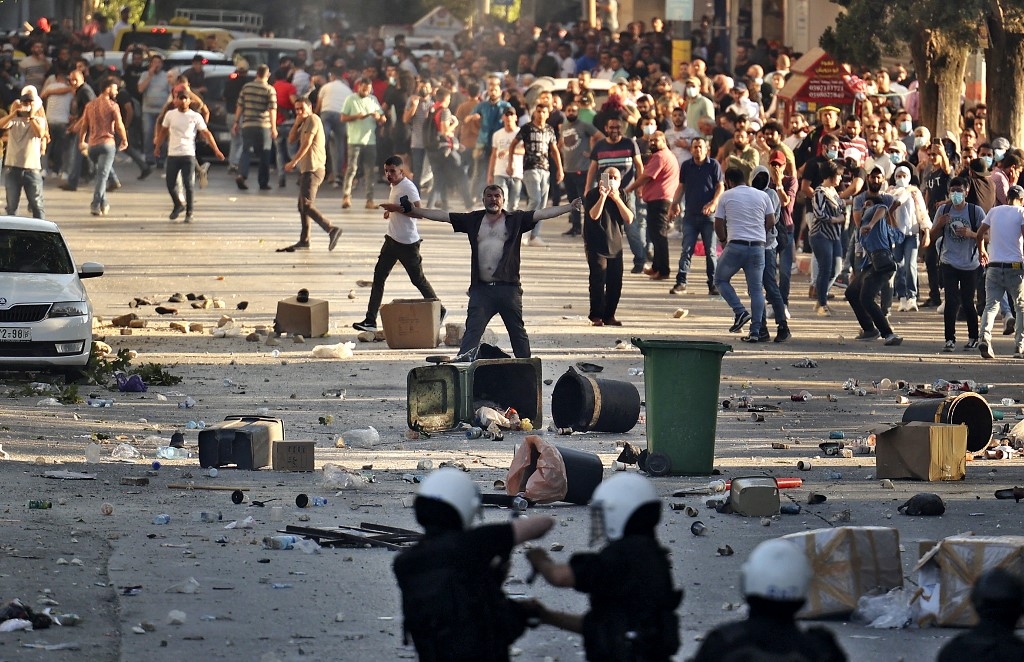
Last weekend, as a Palestinian Authority insider watched PA security forces arrest nearly 30 protesters who were calling for answers about Nizar Banat's death, he recalled what had happened in Egypt 40 years earlier.
"It reminds me of the last days of Sadat," he told Middle East Eye, on condition of anonymity for his safety.
In the weeks that led up to the Egyptian president's 1981 assassination, Sadat had nearly 1,600 Egyptians from across the political spectrum rounded up.
"They started to arrest everyone, like journalists and writers and anyone who stood against Sadat."
The PA's fragility has been front and centre for months, say insiders and observers, starting in April with President Mahmoud Abbas's postponement of parliamentary elections, and then in May as the PA was largely sidelined when Israel bombarded Gaza.
New MEE newsletter: Jerusalem Dispatch
Sign up to get the latest insights and analysis on Israel-Palestine, alongside Turkey Unpacked and other MEE newsletters
Over the summer, the PA has responded to protests critical of its activities, and even those in solidarity with Palestinians in Gaza, with the arrest of dozens of activists, while offering muted responses as Israeli security forces killed 40 Palestinians in the West Bank.
The arrests last weekend, say activists and the PA insider, are only the latest sign of the PA's weakened hand, which they say has left them wondering whether it is losing control of the West Bank.
The demonstrators, including academics, filmmakers and poets, were protesting against the death of Banat, the activist and outspoken PA critic, who died in June after PA forces raided the home where he was staying and violently arrested him.
Hours later, when a vigil was held in protest against the arrests, PA forces arrested yet another protester, Khader Adnan, famous for his record hunger strikes during multiple periods in Israeli prisons under administration detention.
'I can't say that the PA will collapse soon, but for sure it's in a big crisis and I'm not sure where it's going to lead'
- PA insider
Fadi Quran, a human rights activist and international law expert, who was among those arrested, said he was interrogated about why he had distributed Palestinian flags and, during a court appearance, asked a judge to sentence him so he could be the first Palestinian charged with possessing the country's flag.
The absurdity of the moment, and the PA's increasing oppression in the face of criticism, have left many to question whether the lashing out is a last act of desperation.
"All the factors for the collapse of the PA are here," said Jamal Juma'a, director of the Ramallah-based Stop the Wall Campaign.
"Politically, they are expired. As a national project, they are expired. Add to that all the corruption and all the conditions for the collapse of the PA are present."
Said the PA insider: "I can't say that the PA will collapse soon. But for sure, the PA is in a big crisis and I'm not sure where it is going to lead."
Out of hand in Jenin
To see what the PA losing control of the West Bank could look like, Jenin is a good place to start.
In the past two months, there have been several gun battles in the Jenin refugee camp between young armed residents and the Israeli security forces who regularly raid the camp.
After two incidents in July and August in which Israeli security forces wounded Palestinians in Jenin, last week Israeli forces killed four Palestinians during a raid on the camp that turned into a gunfight.
In reaction, Palestinian Prime Minister Mohammad Shtayyeh condemned the Israeli forces, and called on the UN and international organisations to provide protection for the Palestinian people.
But Shatha Hamaysha, a freelance journalist from Jenin who contributes to MEE, said that last week's gunfight was precipitated by the PA's misguided attempts to try and control the situation in Jenin.
The PA, she said, had proposed to mediate between the Israelis and the young armed fighters and arrested several residents who refused to go along with the plan just before the clash. Those who fought reject the PA's interference, including some young men who only recently joined the fighters because they are frustrated with the PA.
She said the PA was trying hard to solve the situation in Jenin "in its own way" while projecting the image that it is in control of the situation, but the reality inside the city is very different.
"The authority has lost its societal presence in Jenin and is trying in various ways to control security, impose order and restore calm," she said.
However, Hamaysha said, tensions were only being fuelled. This week, Israeli forces are carrying out military exercises at checkpoints surrounding Jenin "to deliver a veiled message to Jenin and the young men of Jenin, which are viewed locally as empty shows of power.
'The [Palestinian] authority has lost its societal presence in Jenin and is trying in various ways to control security'
- Shatha Hamaysha, journalist
The PA insider said the inability of PA security forces to protect the residents from the Israelis or to control the armed groups inside the refugee camp was a clear signal. "The PA today is very weak. They can't enter a place like Jenin," he said.
Will what is happening in Jenin spread? That's the question many in the West Bank are asking.
MEE asked the PA whether it was mediating between the young armed men and the Israelis; whether it was arresting individuals wanted by the Israelis; if it had done these activities before the gunfight last week; and whether it had lost control of Jenin.
The PA had not responded by the time of publication.
Different faces, more protests
Another sign that the PA is spinning out of control is the individuals who are being arrested. These aren't Hamas supporters, who are the usual target of the PA, but secular activists, even some who have previously supported the PA.
Mazin Qumsiyeh, a biology professor at Bethlehem University and Birzeit University and a political activist, was among those who protested in Ramallah last weekend. Seventeen of his friends were picked up at the demonstration, he said.
He said he believes the arrests reflect a PA that isn't sure what to do because its usual strategies are ineffective with a public that is no longer afraid.
"They thought the issue of Nizar Banat would end after one month, but it didn't. It's growing," he said. "People are not silent and they are taking action that is growing.
"I believe we are walking in the direction of the PA collapsing, especially the security. People no longer fear the PA. Even those who are arrested are not scared. When the obstacle of fear is gone, everything is possible."
Hani al-Masry, director-general of Masarat, the Ramallah-based Palestinian Centre for Policy Research and Strategic Studies, said the PA's recent behaviour reflected an institution that is lashing out because it doesn't know what else to do after losing its popular support.
'People no longer fear the PA. Even those who are arrested are not scared. When the obstacle of fear is gone, everything is possible'
- Mazin Qumsiyeh, activist
"The PA found itself naked after losing the internal sources of legitimacy - revolutionary legitimacy, the legitimacy of resistance and national consensus, the legitimacy of ballot boxes and the legitimacy of achievement," he said.
"It only had external sources of legitimacy - the legitimacy of power and security - after its political project failed, and it did not adopt a new project."
He added: "It abandoned the leadership of its people in the Jerusalem Intifada in all its manifestations, and felt that events had overtaken it. It wanted to take the initiative again by arresting more than 120 people since last May, to send a strong message that no one, no matter how old, is outside the sword of arrest."
A poll conducted by the Palestinian Centre for Policy and Survey Research and the Konrad Adenauer Foundation in early June, just after Abbas delayed the elections, found that 56 percent of Palestinians saw the PA as a burden on the Palestinian people.
The PA insider said he doesn't think it's in US or Israeli interests to allow the PA to collapse, but said he anticipated very messy times ahead for the body which is divided by infighting.
"There is a big conflict over who will take Abu Mazen's [Mahmoud Abbas's] place and also conflict over ministry positions," the source said.
"Fatah is not united today. There is a split and many of them don't agree with what is happening on the ground, especially the arrests."
Meanwhile, he warned, there were weapons all over the West Bank which were not under PA control.
Stronger political alternative needed
Both Juma'a and Qumsiyeh said Palestinians needed a stronger political alternative to replace the PA - or needed already existing alternatives to seriously challenge it.
"There are so many things that are happening and the PA is arresting Palestinians. But where are the political factions? What are they doing to stop that?" said Juma'a.
'We in Palestine used to congratulate each other when we were [released] out of the occupation prisons, and now we congratulate ourselves for getting out of our own prisons'
- Filmmaker Mohammed Alatar
"The PLO has to take action and interfere. The political factions inside the PA have to resign instead of giving cover to the PA."
The problem, said Qumsiyeh, was that Palestinians saw only two choices in front of them: Hamas or Abbas.
"But this is not true. We have many choices. Many groups were running for election and one of them was Nizar Banat himself. He was not Fatah or Hamas," he said.
"People want complete change, not just a cosmetic one. They want Abu Mazen and all of his system to go away."
Among those arrested over the weekend, there are already plans for further protests.
After he was released from detention, filmmaker Mohammed Alatar thanked people on his Facebook page for sending messages of support after his arrest.
"Actually, I feel ashamed that we in Palestine used to congratulate each other when we were [released] out of the occupation prisons and now we congratulate ourselves for getting out of our own prisons," he wrote.
"I hope all of this mess will stop soon and we will all return to focusing on our first and primary mission of deliverance from occupation and freedom."
And then he encouraged people to return to Manara Square in Ramallah, the scene of the arrests on Saturday, for another protest.
This article is available in French on Middle East Eye French edition.
Middle East Eye delivers independent and unrivalled coverage and analysis of the Middle East, North Africa and beyond. To learn more about republishing this content and the associated fees, please fill out this form. More about MEE can be found here.


